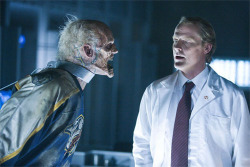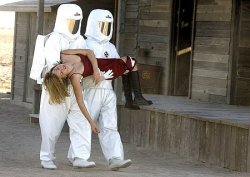Review: Resident Evil: Extinction (2007)
 If you’ve read my reviews of Resident Evil and Resident Evil: Apocalypse, you know that I'm not a huge fan of the series. In fact, I find them to be pretty terrible. At best, they’re mediocre shoot-‘em-ups with some decent effects work. Most of the time, their weak grasp of filmmaking craft and lackluster storytelling techniques make them pretty painful to sit through. So I was not looking forward to Resident Evil: Extinction, the third installment in the film series based on the popular series of video games about a zombie infestation.
If you’ve read my reviews of Resident Evil and Resident Evil: Apocalypse, you know that I'm not a huge fan of the series. In fact, I find them to be pretty terrible. At best, they’re mediocre shoot-‘em-ups with some decent effects work. Most of the time, their weak grasp of filmmaking craft and lackluster storytelling techniques make them pretty painful to sit through. So I was not looking forward to Resident Evil: Extinction, the third installment in the film series based on the popular series of video games about a zombie infestation.
The plot takes place a few years after the previous installment, and finds Earth in a state that pretty much meets the definition of “post-apocalyptic” to the letter. The entire country is now a desert wasteland. It seems the vast majority of human beings have become ravenous zombies, and the remaining survivors have banded together into groups of outlaws and scavengers. Ass-kicking heroine Alice (Milla Jovovich) has gone into exile, convinced her status as a fugitive from the Umbrella Corporation will put others at risk. Also, as hinted at in the second film, she’s now a fully-formed Jedi warrior with telekinetic powers. Don’t ask questions, just go along with it!
Meanwhile, Umbrella scientist Dr. Isaacs (Iain Glen) is holed away in a secret underground lab – without one of which it wouldn’t be a Resident Evil film – attempting to synthesize a cure for the virus using clones of Alice that he created from samples of her blood. And by “cure,” I mean it will turn them into docile simpletons that Umbrella can use as slave labor. Oh, those evil corporations, always looking at the bottom line, even when the world’s gone to hell. How cunning and sinister! Somehow his efforts lead to the creation of crimson-headed Super Zombies that are even more aggressive than before. With results like that, I think somebody needs to go back to mad scientist school.
 If that plot description sounds ludicrous and nonsensical, that’s because it is ludicrous and nonsensical. This movie has clones, psychic powers, super zombies, evil birds, and lots and lots of sand. On paper, one gets the impression Paul W.S. Anderson was tripping on acid when he came up with it. Nothing about it should work at all.
If that plot description sounds ludicrous and nonsensical, that’s because it is ludicrous and nonsensical. This movie has clones, psychic powers, super zombies, evil birds, and lots and lots of sand. On paper, one gets the impression Paul W.S. Anderson was tripping on acid when he came up with it. Nothing about it should work at all.
And yet, believe it or not, it kind of does.
Despite some ridiculous plot elements, Resident Evil: Extinction succeeds where its two previous installments failed: it establishes a clear set of story arcs and spends time developing every single one of them. While there are multiple plotlines, each is given its fair share of quiet moments to breathe and let the audience learn more about the characters. Compared to the second film, there are only a handful of action scenes, which may be why many fans found this chapter to be disappointing. However, each of these sequences is effectively structured and well-crafted, with hints of genuine emotion as opposed to just superficial style. As a whole, the film is nothing spectacular, but it has enough elements in the right place to at least be a fun ride.
 There are also some moments that reflect a genuine understanding of film history and form. The setting of the desert infuses everything with an Old West atmosphere and essentially casts Alice as a female Billy the Kid, clad in a trenchcoat and wielding dual pistols. One sequence recalls Hitchcock and finds a convoy being attacked by a flock of infected crows. As they first enter the scene, the camera zooms out to reveal hundreds of them perched atop every building and vehicle around. It's a nice homage to The Birds, and the scene that follows, while not edge-of-your-seat stuff, is about a thousand times more coherently constructed than any action scene in the previous films. George Romero also gets some love, as large chunks of the desert laboratory and “teach the zombies” subplot are lifted directly from Day of the Dead. Apparently writer Paul W.S. Anderson has finally learned that if you’re going to steal, it’s probably best to steal from good material.
There are also some moments that reflect a genuine understanding of film history and form. The setting of the desert infuses everything with an Old West atmosphere and essentially casts Alice as a female Billy the Kid, clad in a trenchcoat and wielding dual pistols. One sequence recalls Hitchcock and finds a convoy being attacked by a flock of infected crows. As they first enter the scene, the camera zooms out to reveal hundreds of them perched atop every building and vehicle around. It's a nice homage to The Birds, and the scene that follows, while not edge-of-your-seat stuff, is about a thousand times more coherently constructed than any action scene in the previous films. George Romero also gets some love, as large chunks of the desert laboratory and “teach the zombies” subplot are lifted directly from Day of the Dead. Apparently writer Paul W.S. Anderson has finally learned that if you’re going to steal, it’s probably best to steal from good material.
A few of the supporting characters from the second film are back, including the walking stereotype of L.J. Thankfully, while Mike Epps' acting is even worse this time around, he isn't quite as over-the-top and irritating as in Apocalypse, and his scenes are quite watchable. Also returning is Carlos (Oded Fehr), who actually has a bit of a personality and shares an intimate moment or two with Alice. Heroes' Ali Larter pops up as the leader of a traveling convoy and provides a nice onscreen complement to Jovovich’s knife-wielding antics. She pales in comparison to Sienna Guillory as Jill Valentine in terms of intensity and screen presence, but nonetheless carries herself with confidence.
 Perhaps the reason it all works reasonably well is that it’s so straightforward. There are no flashback sequences that serve no purpose except to hide narrative emptiness. No action scenes that feel unnecessary or illogical in their execution. While certain plot twists are vague and may require some suspension of disbelief, all of the major character decisions and motivations are rational and easy to follow. Director Mulcahy, unlike Anderson and Witt before him, realizes that sometimes less is more. There’s no need to batter the audience over the head with constant action and a “cool” aesthetic. In the end, compelling fundamentals will lend more to a film than any amount of stylistic fireworks, and in this regard the film is overall a success.
Perhaps the reason it all works reasonably well is that it’s so straightforward. There are no flashback sequences that serve no purpose except to hide narrative emptiness. No action scenes that feel unnecessary or illogical in their execution. While certain plot twists are vague and may require some suspension of disbelief, all of the major character decisions and motivations are rational and easy to follow. Director Mulcahy, unlike Anderson and Witt before him, realizes that sometimes less is more. There’s no need to batter the audience over the head with constant action and a “cool” aesthetic. In the end, compelling fundamentals will lend more to a film than any amount of stylistic fireworks, and in this regard the film is overall a success.
While Resident Evil: Extinction is flawed, it's without question the best of the series thus far. The action is well-edited, the pace is effective, and there's actually a small bit of effort put into making each character feel distinct. Is it a great film? No. But it's a fairly enjoyable genre flick, with an ending that at least makes me slightly interested in seeing the sequel. That’s more than I can say for a lot of movies these days.